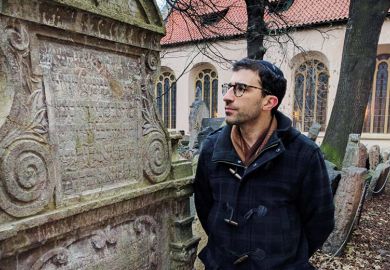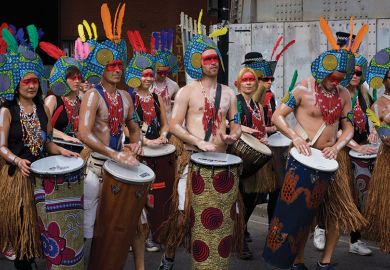Most people who are living through it probably won’t want to remember 2020. But Mark Tebeau and his colleagues are hurrying to document every moment.
An associate professor of history at Arizona State University, Dr Tebeau is co-director of an international collaboration among academic historians to create a digital archive of life during the Covid-19 pandemic, which will include images, videos, oral histories, emails, texts, news stories and social media posts that have become a worldwide form of connection for hundreds of millions largely confined at home.
The researchers call the archive “A Journal of the Plague Year”, a nod to the book of the same name by Daniel Defoe, an account of the bubonic plague’s impact on London in 1665. And while hundreds of other collecting efforts are under way, participants worldwide agree that this one is by far the biggest, involving academics and others – including at universities in the US, Australia, Canada, France, Peru, the Czech Republic and elsewhere – who have so far curated nearly 8,000 items.
“We’re creating a road map that has value to future historians,” Dr Tebeau said. “But future historians will also be able to see us struggling to make meaning of all this ourselves.”
The idea of chronicling history while it’s still under way is relatively new. Oral histories were recorded during the Great Depression and the war crimes trials in the 1940s, but rapid-response collecting took off in a big way after the 11 September terrorist attacks in 2001 and has since included archives related to the women’s marches of 2017, the Australian wildfires and now the protests over killings of black civilians by police.
Some of these efforts have been spearheaded by museums, but many have been undertaken by academics. Columbia University began recording oral histories within days of the 9/11 attacks; Northeastern University gathered digital materials related to the Boston Marathon bombing of 2013.
Advances in digital storage capacity have also helped propel this kind of work. And no event has been as universal as the Covid-19 pandemic.
“This is not a crisis that affects one community,” Dr Tebeau said. “It affects the world.”
Contributors have responded with enthusiasm, said Andrew May, a professor of history at the University of Melbourne and another member of the curatorial team.
Ordinary people “normally think that history happens somewhere else. But it’s actually happening on their street,” Professor May said. “That blows people’s minds who have never found themselves in the middle of the forces of history.”
Some of the items he has found the most compelling have been “mundane, quotidian, everyday stuff – parents stuck at home with the kids and they’re trying to work”. One regular contributor riffs periodically into his phone “in his living room in the suburbs of Melbourne, with the kids in the background and the dogs barking”, said Professor May.
Recording experiences like these can be cathartic for people under stress, said Beth Kleber, head of the archives at the School of Visual Arts in New York, which has been collecting another form of expression of Covid-related experiences: art.
The school has collected 300 works by students, staff and alumni around the world that were created during the pandemic. One shows two lovers wearing face masks and about to kiss. Another depicts a drive-by burial, the casket reflected on the side of the grieving family’s car.
For an artist, this is “a way to handle the emotions and also do something productive”, Ms Kleber said.
The curators assembling these collections said that they have been mindful to ensure that all perspectives are included – not just those of idle artists and suburbanites with time on their hands – by seeking out first-person accounts that are typically not reflected in conventional records.
“It’s changing the conversation about who owns history,” said Jim McGrath, a postdoctoral fellow in digital public humanities at Brown University who helped to create the Boston Marathon digital archive.
Dr Tebeau even tried to coax pandemic deniers to contribute, joining a Facebook group of Covid-19 sceptics to make his case. He got kicked out.
He said: “These are people who fundamentally don’t believe in the pandemic, so how do you get them to give their materials to a pandemic archive?”
For the most part, curators have the opposite problem: an embarrassment of riches, in a chaotic time. Historians often describe their period of speciality as “the Renaissance” or “ancient Egypt”, Dr Tebeau joked. Now some say, “I study 2020 after the pandemic started but before the Black Lives Matter movement,” he added.
Whether people want to forget this year or not, said Ms Kleber, “we’re as close as we’re ever going to get to a common experience for everyone, everywhere. Someday, hopefully, when we’re not in quarantine any more, it’s going to be easy to not think about this moment. But there’s something really valuable in keeping the memories fresh.”
POSTSCRIPT:
Print headline: Global rapid-response archive records ‘life in middle of history’
Register to continue
Why register?
- Registration is free and only takes a moment
- Once registered, you can read 3 articles a month
- Sign up for our newsletter
Subscribe
Or subscribe for unlimited access to:
- Unlimited access to news, views, insights & reviews
- Digital editions
- Digital access to THE’s university and college rankings analysis
Already registered or a current subscriber?








